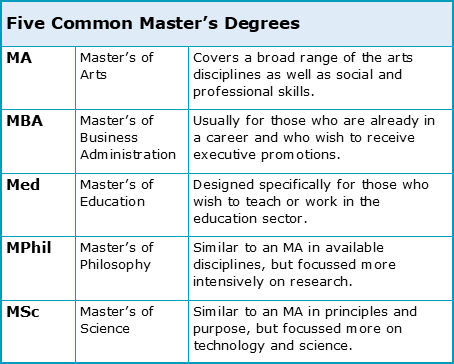What can master’s students expect from a degree?

This is the first of three chapter about Master’s Degrees. To complete this reader, read each chapter carefully and then unlock and complete our materials to check your understanding.
– Introduce the concept of bachelor’s and master’s degrees
– Discuss the usefulness of master’s degrees for students
– Explore the types and costs of master’s degrees
Chapter 1
Although not nearly as common as bachelor’s degrees, master’s programmes in the 21st century are growing increasingly popular. While many students are not yet fully concerned with their career path when enrolling in a bachelor’s qualification, those seeking to do a master’s degree usually have career development more firmly in mind. Deciding whether or not to complete a postgraduate qualification such as a master’s can therefore be an important, lifechanging decision.

Because of this importance, this short three-chapter reader on master’s degrees has been created to assist students in their degree selection by first clarifying the differences between BAs and MAs. Chapter 2 then discusses the steps that students can follow when narrowing down course choices, with Chapter 3 finally providing some essential advice for succeeding at this expert qualification. To check your progress and understanding of these concepts, students may wish to complete our Chapter 1, 2 and 3 activities about this topic.
What is a master’s degree?
Depending on the country, a master’s degree is typically a 1- to 2-year online or face-to-face postgraduate qualification that is awarded by accredited universities and colleges. Although in the USA it is still common to additionally sit standardised postgraduate tests such as the GRE, most universities will accept students onto a master’s programme provided they have successfully completed an undergraduate qualification such as a bachelor’s degree.
The general purpose of a master’s degree is to educate students in a specific discipline to a specialised level, preparing that student for more specialised jobs in the sciences, for example, or for more experienced managerial roles. Because of this difference in focus, master’s and bachelor’s differ in the following six ways:
1. A bachelor’s demonstrates the acquisition of knowledge while a masters generally requires the application of knowledge, demonstrated by conducting original research.
2. Assignments and assessments require a much more rigorous demonstration of scholarly research, procedures and methodology at the postgraduate level.
3. A sophisticated knowledge of existing literature on the topic being investigated is required for every master’s-level assessment.
4. Master’s degrees require a more honed ability to critique, analyse, evaluate and make informed judgements in order to solve complex problems.
5. Contact hours with tutors are typically lower in postgraduate degrees, with even more emphasis placed on the necessity of autonomous learning strategies.
6. There is a higher expectation for the student to engage more fully with the course and department, such as by attending additional talks and scholarly events and by developing more professional relationships with their tutors.
Who should complete a master’s degree?
As with most qualifications, the primary reason for undertaking another period of optional education is to remain competitive in the job market – although the precise motivation for completing a master’s degree does vary from individual to individual. For some, a master’s may be a stepping stone to a PhD, a way to change career paths, or an opportunity to obtain managerial positions within their current sector. For others, regardless of their future plans, having an MA is simply seen as a way of improving job security in the long-term. Whatever the purpose, students should think carefully about their own motivation before committing to another period of education in which they will be spending rather than earning.

What are the different types of MA available?
Similar to a bachelor’s degree, master’s programmes are also broadly divided into the arts and sciences, with ‘MA’ being a common abbreviation for all programmes. However, as postgraduate qualifications are more specialised and career-focused, it’s common to distinguish and separate programmes more explicitly, particularly for subjects such as business. A Master’s of Business Administration (MBA) has in fact become one of the most common postgraduate qualifications around the world.
The following table provides students with the five most common master’s-degree programmes. What this table doesn’t indicate, however, is that in some disciplines such as engineering, medicine and law, it is quite common for students to do an ‘integrated master’s’ in which the bachelor’s and master’s are combined into one due to the requirements of the field.

How much do master’s degrees cost?
While many young people enter into a bachelor’s degree accepting the debt they will accrue, this is not always the case with a master’s degree. Whether it is the wisdom of being a little older or the fact that MAs are often ineligible for the same government loans, students commonly consider the financial burden of a postgraduate qualification more carefully.
While tuition fees vary greatly from institution to institution and country to country, the annual per-year cost of tuition in expensive countries such as the UK is currently around GBP8,000 per year and rising. And then there’s the cost-of-living to consider too, such as rent, utilities, transportation and personal spending, bringing a yearly total to an average of GBP15,000 in countries such as the USA and UK. To determine whether you can afford this large sum, consider the combination of your savings, your future salary, any access you might have to loans, and whether this outlay will be easily earned back by any job that such a master’s degree enables.
Now that you’ve completed an overview of the expectations of a master’s degree, consider next completing our Chapter 1 Worksheet and then reading on to Chapter 2 to learn about how best to select postgraduate courses.
To reference this reader:
Academic Marker (2022) Master’s Degrees. Available at: https://academicmarker.com/careers-advice/getting-qualified/masters-degrees/ (Accessed: Date Month Year).
Downloadables
Once you’ve completed all three chapters in this short reader about Master’s Degrees, you might then wish to download our Chapter Worksheets to check your progress or print for your students. These professional PDF worksheets can be easily accessed for only a few Academic Marks.
Chapter 1 explores the topic: What can master’s students expect from a degree? Our Chapter 1 Worksheet (containing guidance, activities and answer keys) can be accessed here at the click of a button.
Chapter 2 explores the topic: How can I best select an English master’s degree? Our Chapter 2 Worksheet (containing guidance, activities and answer keys) can be accessed here at the click of a button.
Chapter 3 explores the topic: How can my postgraduate success be guaranteed? Our Chapter 3 Worksheet (containing guidance, activities and answer keys) can be accessed here at the click of a button.
To save yourself 2 Marks, click on the button below to gain unlimited access to all of our Master’s Degrees Chapter Worksheets. This All-in-1 Pack includes every chapter, activity and answer key related to this topic in one handy and professional PDF.
There are currently no PowerPoint activities, additional teacher resources or audio and video recordings created for this topic. Please come back again next semester.
Collect Academic Marks
-
100 Marks for joining
-
25 Marks for daily e-learning
-
100-200 for feedback/testimonials
-
100-500 for referring your colleages/friends